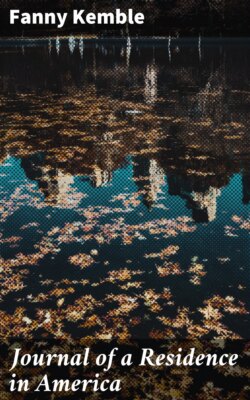Читать книгу Journal of a Residence in America - Fanny Kemble - Страница 33
На сайте Литреса книга снята с продажи.
Monday, 10th.
ОглавлениеTable of Contents
Rose at eight. After breakfast wrote journal, and practised for an hour. ——called. I remember taking a great fancy to him about eight years ago, when I was a little girl in Paris; but, mercy, how he is aged! I wonder whether I am beginning to look old yet, for it seems to me that all the world's in wrinkles. My father went out with him. Read a canto in Dante; also read through a volume of Bryant's poetry, which Mr. ——had lent us, to introduce us to the American Parnassus. I liked a great deal of it very well; and I liked the pervading spirit of it much more, which appears to me hopeful and bright, and what the spirit of a poet should be; for in spite of all De Staël's sayings, and Byron's doings, I hold that melancholy is not essentially the nature of a poet. Though instances may be adduced of great poets whose Helicon has been but a bitter well of tears, yet, in itself, the spirit of poetry appears to me to be too strong, too bright, too full of the elements of beauty and of excellence, too full of God's own nature, to be dark or desponding; and though from the very fineness of his mental constitution a poet shall suffer more intensely from the baseness and the bitterness which are the leaven of life, yet he, of all men, the most possesses the power to discover truth, and beauty, and goodness, where they do exist; and where they exist not, to create them. If the clouds of existence are darker, its sunshine is also brighter to him; and while others, less gifted, lose themselves in the labyrinth of life, his spirit should throw light upon the darkness, and he should walk in peace and faith over the stormy waters, and through the uncertain night; standing as 'twere above the earth, he views with clearer eyes its mysteries; he finds in apparent discord glorious harmony, and to him the sum of all is good; for, in God's works, good still abounds to the subjection of evil. 'Tis this trustful spirit that seems to inspire Bryant, and to me, therefore, his poetry appears essentially good. There is not much originality in it. I scarce think there can be, in poems so entirely descriptive: his descriptions are very beautiful, but there is some sameness in them, and he does not escape self-repetition; but I am a bad critic, for which I thank God! I know the tears rolled down my cheeks more than once as I read; I know that agreeable sensations and good thoughts were suggested by what I read; I thought some of it beautiful, and all of it wholesome (in contradistinction to the literature of this age), and I was well pleased with it altogether. Afterwards read a sort of satirical burlesque, called "Fanny," by Hallek: the wit being chiefly confined to local allusions and descriptions of New York manners, I could not derive much amusement from it.
* * * * *
* * * * *
When my father came home, went with him to call on Mrs. ——. What I saw of the house appeared to me very pretty, and well adapted to the heat of the season. A large and lofty room, paved with India matting, and furnished with white divans, and chairs, no other furniture encumbering or cramming it up; it looked very airy and cool. Our hostess did not put herself much out of the way to entertain us, but after the first "how do you do," continued conversing with another visiter, leaving us to the mercy of a very pretty young lady, who carried on the conversation at an average of a word every three minutes. Neither Mr. ——nor his eldest daughter were at home; the latter, however, presently came in, and relieved her sister and me greatly. We sat the proper time, and then came away.
* * * * *
This is a species of intercourse I love not any where. I never practised it in my own blessed land, neither will I here. We dined at six: after dinner played and sang till eight, and then walked out with D—— and my father, by the most brilliant moonlight in the world. We went down to the Battery; the aquatic Vauxhall was lighted up very gaily, and they were sending up rockets every few minutes, which, shooting athwart the sky, threw a bright stream of light over the water, and, falling back in showers of red stars, seemed to sink away before the steadfast shining of the moon, who held high supremacy in heaven. The bay lay like molten silver under her light, and every now and then a tiny skiff, emerging from the shade, crossed the bright waters, its dark hull and white sails relieved between the shining sea and radiant sky. Came home at nine, tea'd and sat embroidering till twelve o'clock, industrious little me.
